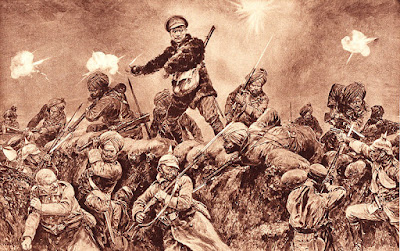 |
| Charles GD Roberts |
Charles
G.D. Roberts, honored as the father of Canadian literature, was one of the older
poets to serve in the war. Born in 1860,
he had to lie about his age to join the army; he served as a troop instructor
in Britain and as a war historian on the Western Front.
His sixteen-line
poem "Going Over" repeats two lines in an
evocative patterning that alternates between reality and dream. The poem is a variant of the French verse
form the villanelle.
Going
Over, by Charles G.D. Roberts
A girl's voice in the night troubled my heart.
Across
the roar of the guns, the crash of the shells.
Low and soft as a sigh, clearly I heard it.
Low and soft as a sigh, clearly I heard it.
Where
was the broken parapet, crumbling about me?
Where
my shadowy comrades, crouching expectant?
A girl's voice in the dark troubled my heart.
A
dream was the ooze of the trench, the wet clay slipping.
A
dream the sudden out-flare of the wide-flung Verys.
I
saw but a garden of lilacs, a-flower in the dusk.
What
was the sergeant saying? – I passed it along. –
Did
I pass it along? I was breathing the breath of the lilacs.
For a girl's voice in the night troubled my heart. For a girl's voice in the night troubled my heart.
Over! How the mud sucks! Vomits red the barrage.
But
I am far off in the hush of a garden of lilacs.
For a girl's voice in the night troubled my heart. Tender and soft as a sigh, clearly I heard it. |
|||
The
poem speaks with two voices: the soldier in battle and the lover in a garden
may be the same man, but the war has put an impenetrable barrier of
experience between them. It is nearly
impossible to reconcile the two identities in the body of one person, and so
the poem asks us to enter into a world of alternating realities.
We
see the gulf between the two worlds open up in the white space that lies between
the title "Going Over," with its charge into the clamor of battle,
and the first line's faint call of the "girl's voice in the
night." In the second line, the
"roar" and "crash" of war again intrude, but fade into background
noise when the girl's voice, "low and soft as a sigh," is clearly
heard above the din of the fighting.
Clearer
than the call of war, the girl's voice speaks of a deeper reality, one that
causes the "ooze of the trench" and the "wet clay
slipping" beneath the soldier's feet to fade into "a
dream." The soldier, as if drunk
on the scent of lilacs "a-flower in the dusk," not only cannot hear
his commanding officer – "What was the sergeant saying?" but is
unable to remember if he has passed on the order to go over the top. A part of this man has left the trenches
and is fully alive in another moment, "breathing the breath of the
lilacs."
 The
war desperately fights to gain the soldier's attention: in the time it takes to read the poem's thirteenth
line, we feel the sucking mud and are deafened by the barrage of artillery
and machine gun fire that "vomits red" in a shower of blood and
bone. During the First World War, the
noise of the shelling was so loud that historian Paul Fussell notes those in
the southern counties of England, "could literally hear the war" in
France and Belgium. Robert Traynor, in
his article "Hearing
Loss in the Trenches," explains, "During a bombardment the
noise was loud enough to split the eardrums, and it quite commonly caused
permanent hearing loss."* The
war desperately fights to gain the soldier's attention: in the time it takes to read the poem's thirteenth
line, we feel the sucking mud and are deafened by the barrage of artillery
and machine gun fire that "vomits red" in a shower of blood and
bone. During the First World War, the
noise of the shelling was so loud that historian Paul Fussell notes those in
the southern counties of England, "could literally hear the war" in
France and Belgium. Robert Traynor, in
his article "Hearing
Loss in the Trenches," explains, "During a bombardment the
noise was loud enough to split the eardrums, and it quite commonly caused
permanent hearing loss."*
But
the horrific presence of the war lasts merely for a line before consciousness
is pulled back to the only thing that can really trouble this man's heart:
the voice of a girl in the night. The
poem closes with the repeated refrain.
Like a meditative whisper, the lines attempt to assure both the
soldier and the reader that life and hope wait beyond the trenches and going
over the top, whether that life and hope lie in this world or the next.
*Francis
Itani's World War I novel Deafening
is a powerful and poignant book that explores sound and silence in the
war.
|













